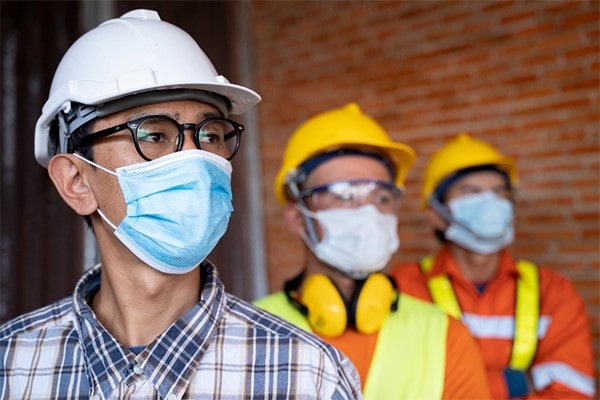Sector - Health & Safety
How COVID Has Affected Health & Safety

As the UK begins its exit from lockdown, the trade industry can look to slowly relax its Covid restrictions. Life-critical health and safety product provider, Reece Safety looked at how the pandemic has changed health and safety across the trade industry, and whether the stricter elements brought about by the pandemic are here to stay.
The trade sector stayed open throughout most of lockdown
Many trade businesses and work sites were open across the second lockdown while the rest of the country stayed home, meaning many trades workers across construction sites, factories and manufacturing plants worked in additional PPE, with sanitising stations, and enforced social distancing measures in place to meet demand as essential workers. In addition to existing health and safety procedures, Covid-19 saw new regulations brought in to protect industry workers.
Construction was most significantly affected
Research found that the construction sector has been significantly affected by Covid‐19, as there has been a potential knowledge gap regarding the practical feasibility of applying Covid‐19 measures within construction, made more difficult by factors such as the types of projects and complex working environments.
In the UK, the construction industry is worth over £100bn and employs over 2.4 million people, with the immense sector adjusting to new ways of working. Throughout the pandemic, it has been hit hard by both stricter safety precautions and higher rates of infection due to an ageing workforce, with over 40% of workers over 40 years old, and a significant number of over 55-years-old1. This means that the construction sector had a slower rate of productivity and profitability throughout the pandemic due to illness.
Self-employed tradespeople were also affected
Covid not only affected the workforce for larger businesses but has also had a direct impact on self-employed tradespeople. Gareth, a joiner from Sheffield, explained how new health and safety measures have affected his business: “Covid health and safety measures have made working more complicated, with more measures to consider for each job. However, it is important for everyone to remain cautious and stick to the implemented safety measures as I spend much of my time in people’s homes, so it is vital to ensure correct PPE is worn, the household is Covid-free, and I am safe from risk of transmission while working. Post-Covid, I am sure that much of the public will remain cautious for a long time, ensuring that the spread continues to slow, which means tradespeople like myself can continue to feel safer.”
Many businesses struggled to maintain staff training
As rigorous health and safety procedures came into action for the trade sector to enable workers to continue working, many important parts of the job, such as upskilling and training staff, took a back seat.
Managing Director of Reece Safety, Andy Graham, explains why he thinks some elements of health and safety introduced throughout the pandemic are likely here to stay: “We noticed that many businesses struggled throughout the pandemic to upkeep training for new staff and deliver refresher training to existing staff as trade sector businesses shifted their focus to ensuring staff safety and welfare.
“To accommodate, we introduced “live stream” virtual training sessions and socially distanced learning environments to ensure that businesses can keep up with necessary health and safety training for their staff, with offerings such as confined space supervisory training and lockout tagout training. As things go back to normal, we are sure that flexible ways of training will allow businesses to train their staff in a much easier way.”
For more information on life-critical safety products to keep your business and staff safe, visit: https://www.reecesafety.co.uk/
If you would like to read more stories like this, then please click here
Related Articles
More Health & Safety Features
- Construction workers face the highest risk of fatality
13 Aug 25
Construction workers face the highest risk of fatality, with one in two Brits saying HSE training is skipped due to time pressure.
- A new chapter for the Building Safety Regulator
12 Aug 25
A package of potentially significant reforms to the makeup of the Building Safety Regulator have been announced.
- Radical action to speed up removal of unsafe cladding
18 Dec 24
The government has set out tough new targets to fix unsafe buildings in England.






